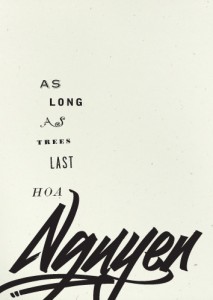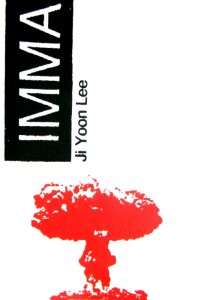As Long As Trees Last by Hoa Nguyen | Wave Books 2012 | $16

Hoa Nguyen’s As Long As Trees Last is not a book for the city. Shouting concrete and signal siren screech, emit exhaust, make it difficult to “string and feel // wind of wing beats / in your face” (1). Take these poems into the grove and let the “trees be the church” (32). What you have reads like the diary of a hapa witch, a cross-section of all seasons. The shortness of line and breath in Nguyen’s work makes for ritual incantations in a forest clearing, for songs for invasive seeds.
Nguyen utilizes the Chinaberry tree, indigenous to parts of Southeast Asia but later introduced to the southern United States, to hint at a larger discussion around diaspora, transnational economies, transplants, and transracial intimacies. Born in the Mekong Delta, Nguyen has lived for some time in Texas. Of Thai ancestry, I was raised in West Virginia and Virginia. Like Nguyen, I am also a person of mixed race and understand the kind of odd resonance between the Southern states and Southeast Asia that occurs in the humidity, leafy foliage and rolling mountain ranges. The speakers in Nguyen’s poems often feel like invasive species with toxic fruit, growing wild with distant roots, endangered but tasked with “rag laundry day” and “beans on toast,” no stranger to the poetry that halts and swings from their throats.
I am interested in the contraction of line that works in Nguyen’s poetry, which is also apparent in the way her breath designates measure when she reads her work. Her short lines are fragmented by breath patterns, and the breakages are defined by elongated exhales and sharp inhales. Spaces between lines and phrases often expand abruptly and then contract, like a lung muscle.
Green bathroom floor
rug and the yellow mug
you loved Cutting stop
Stop her there like a
yield color
[…]
We love are
We love are folds
around the stripes of being
Can be
We can We love
are slung nests
(from “Dirt-Under-Nails Dirt,” 7)
In the excerpt above, notice how “rug” and “mug” snugly bookend a line, yet how the line immediately following (“you loved Cutting stop”) offers a break, a brief but scary expansion between “loved” and “Cutting,” and a “stop” to counter the preceding rhythm. Notice how “We love are” could be read as “We love our” and how the syntax breaks the relationship between verb and object. In the excerpt below, watch the turns between “pen,” “Open,” “born,” “Horn,” “gown,” “torn” and “train,” as well as the ones between “feathers,” “violet,” “insides,” “heart,” “held,” “cup” and “dark.”
So obvious feathers on a heart pen
or beneath violet insides Open
center when your heart is a
small baby born
Horn cup held inside and you wear
a gown with dark torn
a dark train
and starry yellow
flags for me maybe also
summer cicadas
(from “So Obvious,” 12)
As Long As Trees Last writes the stubborn, sassy and slicing survival of a woman that listens to the rage and whisperings of the land—”My soil: alluvial / the fertile where my mother birthed” (25). Nguyen examines the bottom of a pioneer’s foot and knows what it means to be two [verbs, languages, adjectives, emotions] at the same time. From “Adopted” to “Native” to “Thatch,” “Trust” and “Vine,” these are some “Words You Should Know” when learning about the binding contracts and rapid contractions caused by diaspora’s intimacy with our world.
* * *
IMMA by Ji Yoon Lee | Radioactive Moat Press 2012 | Sold Out, Free Download Available

Ji Yoon Lee’s chapbook IMMA is an explosion. It’s a minefield of samples spitting up in your face. It’s your life on a weapons of mass destruction diet. It’s pissed off, cocked and ready to rock. If war wrecks language, then IMMA has been reloaded from the wreckage.
I first saw Lee perform at this year’s Delta Mouth Literary Festival at Louisiana State University. In one piece, she spoke in Korean through a tiny bullhorn that made her voice tinny and mechanical, while playing a recording of the text (put through Google Translate several times) read in English by a computerized voice. I was blown away by her strategies of translation and her efforts to make language strange, a tactic that she uses in IMMA. These poems are made of a mangy, mangled, “commingledlanguage” that is fused and unwilling to be pulled apart. Words merge and clump in the mouth, unapologetically yelling.
The United States’ historical participation in war in the Pacific theater, and all that comes with it (R&R, mail order brides), has shaped so much of what Asian/White and Asian/American intimacies have become and continue to look like in the western imagination. War has directly contributed to the ways bodies of “the other” are carved and cut into and has influenced the readiness to feast on fear and feed into narratives of domination. “[Y]our synergistic globalization is my conglomerate prostitution:” writes Lee, who drops glitter bombs on gendered and racialized fantasies of supremacy and submission in this book and stares you down until you take it.
I’m ok being your diversity plan;
It is my mode of existence: It is my mode of insistence
There is the cityplan under my belt of explosives;
It is my mode of modification: It is my mode of fornicationDefamation of American flag: Defecation of unidentifiable flag
An unidentifiable body surfaces on the level of cheap alliteration
Please do not litter; be a good noncitizen
Please use the container provided; be a good conartistIs it ok that I am your diversity case? Is it ok that I am your basket case?
Is it tolerable that I am your varsity case? Is it permissible that I am your it-girl showcase? […]
Is it okay I’m in your suitcase? Is it ok I’m your cold case? […]
My belly is warm and I am your forensic case(from “To:”)
In the opening poem, “To:,” I love the way “existence” becomes “insistence,” “modification” becomes “fornication,” “Defamation” becomes “Defecation,” “alliteration” becomes “litter,” “container” becomes “conartist,” “flag” becomes “body,” “basket case” becomes “showcase” becomes “suitcase” becomes “cold case.” Each word has a volatility of sound that threatens to transform, changing its molecular structure and its meaning. The references to “diversity plan” or “diversity case” hint at some kind of tokenization or exotification that the speaker fights against through the course of the piece—fighting even past death, the belly still warm.
Imma manhandle my fatbags like a boss
Imma boorish catcall your funsacks like a man […]
Imma torch your house; lit with your beeswax
Imma rugburn your place down; like a boss on the secretary desk
Mind your own baloney business
& Go make me my balcony suicide sandwich(from “you can’t handle my bloodhole”)
In “you can’t handle my bloodhole,” Lee lets fly more of her “commingledlanguage,” and like a “balcony suicide sandwich” you thought was baloney, it can be hard to chew. Words like “manhandle,” “fatbags,” “catcall,” “funsacks,” “beeswax” and “rugburn” roll around in the mouth but won’t break in two, just like the full-throttle, contractive force of “I am” and “gonna” in “Imma.” Ji Yoon Lee’s IMMA barrels on. It’s not water-soluble, “but you may need to swallow it.”
One thought on “Two Reviews: Hoa Nguyen’s AS LONG AS TREES LAST and Ji Yoon Lee’s IMMA”